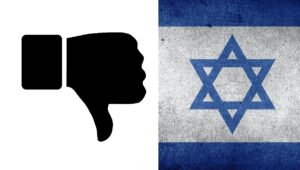Late last week, a large explosion rocked the site of a former Israeli military-industrial factory outside the coastal city of Herzliya. A crater with a diameter of about eight meters was formed at the site of the explosion, according to fire and rescue services. Judging by the photo alone, this looks like a rocket crater. An Iranian missile attack on Tel Aviv was reported on both Israeli and Arab social networks. Arabic sources in particular fantasized about an Iranian bombardment of Israel. Distinguishing between true and fake news is becoming increasingly difficult. In the end everyone believes what they want to believe.
Official government sources were quick to say the cause of the blast was not military activity in the area. The blast was heard throughout central Israel and the coastal area, in cities like Tel Aviv, Ramat Gan, up to Rosh Ha’ayin. Herzliya residents also reported an unusual smell after the blast and a substance in the air that caused burning in the eyes. An eyewitness told Israeli media that the terrible explosion, initially believed to have been caused by an explosive device, filled the area with black smoke. “I was covered in sand. Sand fell on my head. I couldn’t see anything,” he said. Other eyewitnesses reported similar things.
But parallel to Israel’s statements, Israel’s enemies took the opportunity to spread fake news and doubt, suggesting that an Iranian missile may have hit Israel. An army of Twitter bots are spreading Iranian propaganda on social media, and this has been happening for quite some time. Lies are spread with fake photos and Hebrew captions: “Benjamin Netanyahu censors an Iranian missile attack just to avoid war,” read one “urgent” message posted by someone under the name “Benjamin.” The post added: “Everyone has to understand that Iran beats us every day and we look on in silence. Tonight, Iran officially launched the missile war on Israel.”
נתניהו מצנזר את מתקפת הטילים של איראן רק כדי להימנע ממלחמה אנא פרסמו את המאמר הזה כדי שכולם יבינו שאיראן מכה בנו כל יום ושתקנו. הלילה הכריזה איראן רשמית מלחמה במתקפת טילי הפתח על הרצליה@Terror_Alarm https://t.co/ED9hvjFTGm
— בנג’מין (@psd_ssd) June 22, 2023
Not only that, this “Benjamin” used photos of rocket strikes in Syria and compared the impact craters to that in Herzliya. “Iranian Fateh 313 missiles, hence the craters look one-to-one.” According to Iranian fake news, the target was the chemical industry of the Israeli army in Herzliya. All of this was circulating on social media while Israeli media was talking about a factory accident. Now the average Israeli had to decide who to believe: the official media and army spokesmen, or Iranian propaganda in Israeli guise? Of course, fake news caused panic at first. Our enemies want to agitate and weaken Israel with this.
לא משנה כמה תרצו לצנזר, לא תצליחו
על פי צילום הבור, אנו יכולים לחזות כי מפעל התעשייה הכימית של הצבא היה מטרה של טילי הפתח 313 של איראן pic.twitter.com/HGFYHnqgGX— בנג’מין (@psd_ssd) June 22, 2023
Tweet: No matter how hard you try to censor, you won’t succeed. Photo of the pit suggests that the army’s chemical plant was the target of Iran’s Fatah-313 missiles.
In Israel, this explosion prompted a number of questions and criticism. Herzliya Mayor Moshe Fadlon stated: “The area is a ticking time bomb that must be neutralized immediately.” Fadlon told Army Radio that he was aware of the explosives dump in the area and that a court ruling ordered the authorities to clear the area more than six years ago. But now everyone is too busy with judicial reform. “There’s a mountain full of explosives here,” he warned. It was recalled that in the same place in 1992, an explosion at the munitions factory, which was still in operation at the time, killed two people and injured over 60 others.
In the digital world, it is becoming increasingly difficult to distinguish between right and wrong. Not that it was always easy in the past, but in our generation, fake news is often spread more credibly than the truth. It’s a good thing that Israel Today is here for you in Jerusalem. Have a blessed week.














